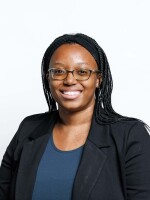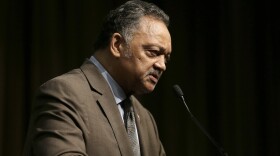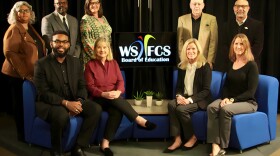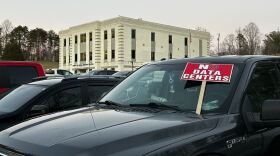After serving as chancellor at UNC-Chapel Hill for five years, Kevin Guskiewicz stepped down as the university’s leader on Jan. 12 of this year. He’s been replaced by Interim Chancellor Lee Roberts, who started on the same day.
Guskiewicz’s tenure, like his predecessor Carol Folt, was punctuated by several high-profile events, including an affirmative action case the University lost at the Supreme Court and a messy effort to hire Nikole Hannah-Jones to the journalism school faculty.
Soon, a 13-member search advisory committee will get to work to find the new, permanent chancellor at UNC-Chapel Hill. UNC System President Peter Hans will be at the center of that effort. He will appoint members of the committee and eventually make the final choice.
Hans recently spoke with WUNC higher education reporter Brianna Atkinson about the chancellor search process, the challenging governance structure a chancellor faces and how NC State chancellor Randy Woodson has avoided all the drama that seems to envelop Chapel Hill.
NOTE: This conversation has been edited for brevity and clarity.
What qualities are you looking for in a chancellor at UNC-Chapel Hill?
"I would say there's an evergreen set of qualities that we're looking for at any institution: personal integrity, leadership capability, vision for the institution, appreciation for working with all the stakeholders. You know, that sort of thing. That doesn't tend to vary from place to place or search to search. So, I think those are with us any time we're going through a chancellor search."
Do you think it's also important, at least for UNC-Chapel Hill, for the chancellor to come from North Carolina?
"No, not necessarily. I think it helps to have some knowledge of the state. They don't have to be born here. They don't have to have lived their whole lives here. But hopefully, they've been here. I feel very strongly about North Carolina. I love this place. I love our people. I know every nook and cranny of this state. I’ve been to all 100 counties for one reason or another, and this is a very special place. So, if you were to ask me to go to North Dakota, I'm sure it's a lovely place, but I would not feel the same way about North Dakota that I do about North Carolina. And having candidates who've had some exposure to North Carolina, I think is a positive, but it's not a prerequisite."
Does a successful UNC-Chapel Hill chancellor need to come from academia?
"I'm open-minded on that as well, Brianna, because there are great examples of academics who make wonderful chancellors, wonderful leaders. And there are plenty of examples of where that hasn't worked well. It depends on the individual.
"Now, there are fewer examples of non-traditional candidates serving in those roles. But here again, there are positive examples and there are examples that would suggest caution.
"I tend to be of the mind that these institutions are very large, particularly Carolina, and complex. And I'm looking less for somebody to teach in the classroom than somebody who has both those attributes that I'm seeking and the campus community is seeking and is able to lead the institution to greater heights, than to say on the front end, 'Well, it has to be an academic or it has to be a business person.' I'm not wedded to either one. I have approached that with an open mind."
UNC-Chapel Hill has had several chancellors in the same time period that Randy Woodson has been chancellor at NC State. Why do you think that there can be so much stability in the leadership position at one prominent university in the UNC system and then so much turnover at another?
"First of all, Chancellor Woodson, an academic, is a phenomenal leader and has led NC State to new heights. So kudos to him. In the next few years, he'll likely retire and we’ll search for a new leader at NC State.
"But it will likely be a very sought-after position, because of the work that he's done to advance NC State. I wouldn't necessarily want to follow him, any more than I’d want to follow Harold Martin as chancellor of A&T, because they're legends. They've done a phenomenal job in very difficult circumstances.
"These roles of serving as chancellor are, people think, well, wow, you get this fancy title and the glory just starts rolling in. In fact, they're really difficult. They're really difficult. You, to some extent, have to be all things to all people, and people feel very strongly about their institution and they're more than willing to let you know on a daily basis what they think. All of which is good, but leadership of a public higher education institution is a challenge.
"I think that's been true here at Carolina, as it has nationally. The average, I think, for chancellor or president is about five years nationally at this point. So, we're right in line at Carolina with that. At Carolina, it's even more challenging because the institution has always been at the crossroads of North Carolina's political, social, cultural debates — always. I mean, when you look back to the founding of the institution, people have always felt strongly about Chapel Hill. Mostly good, some not nearly as supportive. But people are passionate about the place, they have strong feelings about the place. And that's a great strength in so many ways. And yet, in other instances, it can be a challenge for a leader to have a long tenure as a result of that.
"Now, I think each of those leaders has given all they could to this institution and loved it and worked their way through the traffic as best they could. And I appreciate their service. I feel that way very strongly about my friend Kevin Guskiewicz."
Who is the UNC-Chapel Hill Chancellor most accountable to? Is it you? Is it the UNC-Chapel Hill Board of Trustees? Is it the Board of Governors?
"This is a constant misunderstanding. Each of the chancellors report directly to the president. There is no misunderstanding about that with the chancellors. Boards of Trustees are largely advisory. They are delegated some authorities by the system-wide Board of Governors to look after things on campus. And that's spelled out in great detail. But they are advisors to the chancellor. The chancellor must work with the trustees, but he does not report to the trustees."
Some previous chancellors have said publicly that the UNC governance structure is a distinct challenge, even untenable, and that politics plays too large a role in how the university is managed. Do you think that's true?
"Yes, of course, well, we just spoke of Randy Woodson, Harold Martin and others who have been there 15, 17 years, they've been able to do so. Now, they're phenomenal leaders and we do have a complicated governance system, but there's nothing new about this governance system.
"It's always interesting to me to hear people say, 'Oh, I can't believe this or that lately. This has been the governance system since the university was consolidated in 1971. So a little bit of history here is helpful. You know, the state legislature, whether it's controlled by Republicans or controlled by Democrats, they elect the Board of Governors. The Board of Governors has one employee — that's me, the president. The 17 institutions have a chancellor, they report to me. They don't report to the trustees. They don't report to the Board of Governors. They report to me. And that has been the process since I was born — I was born in 1970. But that's been the case, and it is useful to remind people that that has been the case and that has not changed. Because there seems to be this perception that somehow this is new or something they didn't understand."
Lee Roberts is about a week into his tenure as interim chancellor. What has been your advice to him as he's made the transition?
"Well, Brianna, I'll probably leave that with Lee and myself, of course. But I will say, since tapping him as interim chancellor in mid to late December, he has worked very hard to make the rounds meeting with people — obviously, people he will be working with, in addition to faculty and staff and students and trustees and donors and others with an interest in Chapel Hill, and (he) had his first trustee meeting this week.
"I think he is thus far enjoying the role. And it's very early, obviously, but he's doing exactly what he needs to be doing, which is keeping things calm and cool and collected, and let's focus on continuing to make progress."
You mentioned the UNC-Chapel Hill Board of Trustees meeting. One of the things that came up is that the Graduate and Professional Student Senate recently passed a resolution asking for representation on the chancellor search committee. Specifically, they are asking you to appoint one undergraduate student and one graduate or professional student to that search advisory committee. Do you plan on granting this request?
"So, certainly sympathetic to the point. Again, the search committee policy has changed during that time, the size of the search committee (the last chancellor search) was two or three times as large. So, it's a different process. I absolutely commit that we will have a listening forum specifically for graduate and professional students at Carolina. I happen to be quite supportive of some of the issues that they're raising about stipends, for example. They're doing a lot of teaching, and we appreciate that, and it makes it very difficult for them to make ends meet. So, I think that should be part of the conversation with the search committee. The number of members on the search committee, the 13 people, and the particular roles are going to make it very difficult for me to appoint a graduate student. It would require me to somehow bump someone from the faculty, and I'm not going to be in a position to do that. I will, however, absolutely commit to holding a listening forum, specifically for graduate and professional students. And I hope they'll engage with the search committee, because we need their feedback."
And do you have any timeline on when you and Board of Trustees Chair John Preyer will announce who you select to be on that committee?
"So, under the policy, I am to consult with the trustee chair and hear his thoughts about the search. And for him to hear my thoughts about who I plan to appoint to the committee. Now, I've given this a great deal of thought. I certainly want his input about the trustees that will be members of the search, since that is the board he leads. I am hopeful that I will be in a position to appoint the search committee, if not by late January then early February."
What advice would you give to a new permanent UNC-Chapel Hill Chancellor?
"Serving as chancellor at Carolina is an enormous privilege. This is the fourth ranked public higher education institution in the country, and likely in the world. I mean, this is a global research university. We're seeing record applications, record research funding, record donations, world-class faculty, (a) student body that's phenomenal, hard-working staff. There are so many assets here.
"And we are supported by the people of North Carolina very, very generously. North Carolina ranks in the top five in the country on a per capita basis in funding for higher education. So, this is going to be a highly sought position. I've been hearing from sitting presidents across the country who are very interested in this role. So, I think we're going to have a very deep pool of candidates to choose from across campus and across the country. And I'm excited about that.
"At the same time that I would share with any prospective candidate this is a wonderful role to do so much good to help so many people in North Carolina and well, well beyond, it's also a challenging one because we're a public institution. And we do have those people who care so passionately about Carolina, and they will weigh in from every conceivable viewpoint. And you'll have to navigate some of those situations. I think it can be done.
"I am extraordinarily optimistic about the future of Chapel Hill. I'm a proud alum of this institution. I live right here on campus. I care very deeply about it. And I think the future is very bright."







